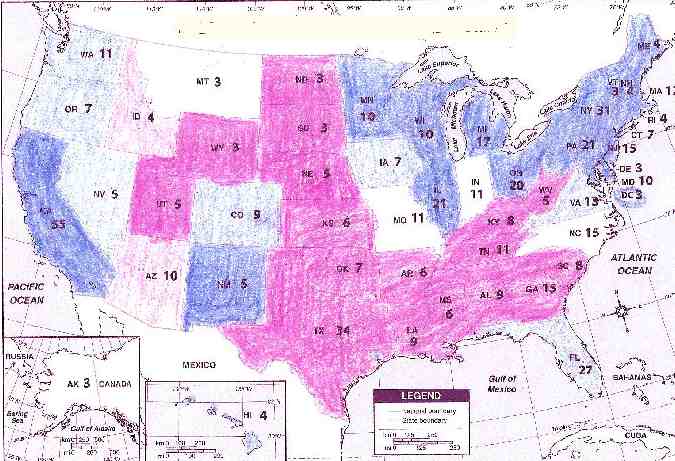
This looks good enough for us, says the American Cable Association
A lobbying group for small cable operators says the nation’s current broadband availability maps are flawed, but good enough for the FCC to rely on to veto funding for rural broadband projects that might compete with some of their members.
The American Cable Association submitted its comments to the FCC as part of discussions about the next phase of broadband subsidy funding from the Connect America Fund.
Most current broadband maps rely heavily on unverified data voluntarily submitted by existing broadband providers or by third-party groups that are funded or controlled by some of the nation’s largest phone companies. Both have a vested interest painting an optimistic map of solid broadband coverage as a tool in the ongoing public policy fight pitting broadband advocates clamoring for better access and speed against the cable and phone companies that offer the service.
ACA members are concerned that the government might subsidize new broadband start-ups that could eventually compete against existing cable companies. The group calls such “overbuilders” redundant and wasteful.
“The FCC should protect the public by ensuring that broadband deployment subsidies do not result in significant government-supported overbuilding, which would cause real harm to cable operators that have invested only private capital,” ACA President and CEO Matthew M. Polka said. “It would also mean that locations across the country that need support will not receive broadband because the program would not have additional funding.”
Don’t Surprise Us With Doubling the Minimum Speed Requirement When We Thought 3Mbps Service Was Good Enough
ACA member cable operators assumed they would be safe from the government-funded overbuilders if they provided at least 3Mbps broadband, but now the FCC is exploring doubling the minimum speed to 6Mbps, which threatens a number of smaller cable operators that have avoided upgrades to increase speeds.

Polka
“This is a huge burden on a smaller operator. These operators assumed when they filed data through the State Broadband Initiatives (SBIs) in June, 2012, providing service with speeds of at least 3 Mbps/768 kbps service was enough to protect them,” Polka said.
The ACA also wants the agency to initially reject applicants for broadband funding if current broadband map data shows another provider operating in the area, even if that provider’s volunteered service coverage maps are exaggerated.
“The Commission should presume the National Broadband Map (“NBM”) is accurate and rely upon it in identifying eligible areas for Phase II support, even though it is a work in progress and contains inaccuracies. The reasons for this conclusion are many.
First, the NBM is the most accurate and most granular representation of national broadband deployment that currently exists. Second, the federal government has already made a significant investment in the NBM, is seeking to further perfect its data, and clearly intends for it to be a key tool upon which to base its policies.
The group also warned that if the FCC does not rely on its inaccurate map, providers might be hesitant to voluntarily supply more coverage data in the future.
Prove That We Don’t Already Provide Service If Your Broadband Operation Wants Funding
The ACA’s comments also urge the FCC to require would-be new broadband providers to have the burden of proof that a cable operator does not already offer service in an area before they can qualify for Connect America funding. How? By calling the cable company pretending to be a new customer and seeing if they can schedule an installation at each particular home a provider plans to serve.
“In the normal course of business to attract customers, small cable operators post their service areas and broadband service offerings,” writes the ACA. “All a [new entrant] needs to do is survey the operator’s website and advertisements and, if necessary, call customer service. In contrast, it would be a much greater hardship for small cable operators, who lack regulatory staff and have already made the effort to be designated on the [map], to bear the initial burden and start from the beginning to submit documents to ensure they are on the map.”
In short, the ACA wants the FCC to assume their cable operator members cover an area until proven otherwise.
“It would be far less burdensome for the [new entrant] to challenge [allegedly inaccurate coverage map data] first, in which instance only those operators who are challenged would need to reaffirm their presence,” writes the ACA.
Because We Are Cable Operators Running the “Robust DOCSIS Platform,” It Means We Already Provide Great Service
The ACA also called on the FCC to give cable operators a free pass from demonstrating they can meet the Commission’s quality of service standards regarding latency and the responsiveness of the customer’s broadband connection.
“For cable operators, the Commission should presume that because they employ the robust DOCSIS platform they meet the latency requirement,” the ACA wrote.
Committing to study and oversee the quality of cable broadband is also a really bad idea according to the cable lobbying group.
“Further exploration of a cable system’s latency performance without clear and convincing evidence to the contrary would be unproductive for the Commission in carrying out its public interest mandate and for cable operators,” the ACA argued.
Don’t Tell Us What We Can Charge and What Usage Limits We Can Impose; That Should Be Reserved for Wall Street and Our Investors
The ACA is also concerned that the FCC might consider the price consumers pay for rural broadband and what usage limits rural cable operators impose when deciding whether it is time to help fund the launch of a competing provider.
Captive rural customers can pay the same or higher prices for much slower broadband service than urban Americans pay, but the ACA advocates the FCC look the other way and avoid making any such comparisons:
“[…] There are many reasons for the Commission to refrain from establishing (even minimal) comparable rates and terms of service for the provision of broadband service by cable operators to be deemed as “serving” an area.
First, the Commission should recognize that cable operators as a rule build their networks and provide broadband service with no government support, only using private capital and based on a business case enabling them to receive a market return on that investment.
Any effort by the government to impose price or usage allowances – that is regulate the service – has great potential to lower that return and slow rural broadband deployment. With universal service funding limited, this would lessen the ability for the Commission to achieve its objective of bringing broadband to unserved areas.
Further, it would be almost impossible to establish a reasonably comparable rate and terms of service because, at least for cable operators, these change so often and are usually offered in bundles with other services. Most cable customers subscribe to either or both a package of services and some sort of promotional offering. Further, bundles are far from homogeneous and operators change frequently. All of this makes it virtually impossible to have valid urban-rural comparisons.
[…] Finally, if it were to establish a comparable rate and terms of service for broadband, the Commission would be acting in an area where it clearly lacks authority.
[flv width=”528″ height=”318″]http://www.phillipdampier.com/video/MSNBC A Mom and Pop Cable Company by OPEN Forum 3-30-13.flv[/flv]
ACA past chairman Ben Hooks, CEO of Buford Media and operator of cable systems under the Alliance Communications brand, appeared on MSNBC to rail against federal cable broadband regulations and oversight requirements. Hooks operates several small cable systems in Texas, Oklahoma, Arkansas, Louisiana, Mississippi, and Alabama that are throwbacks to a much earlier era of cable. Many offer just a few dozen channels and deliver no broadband or cable phone service.
Hooks is upset because the federal government wants to help fund new start-up broadband providers in his backyard. He thinks this is unfair, because his cable operations, run with largely refurbished, cast-off cable equipment discarded years ago by larger cable operators, is funded with private capital and may have to compete with new providers partly funded by the Connect America Fund. In the middle of the dispute are rural Americans who cannot get broadband from Alliance Communications and would be prevented from getting it from anyone else if Hooks has his way. (6 minutes)


 Subscribe
Subscribe